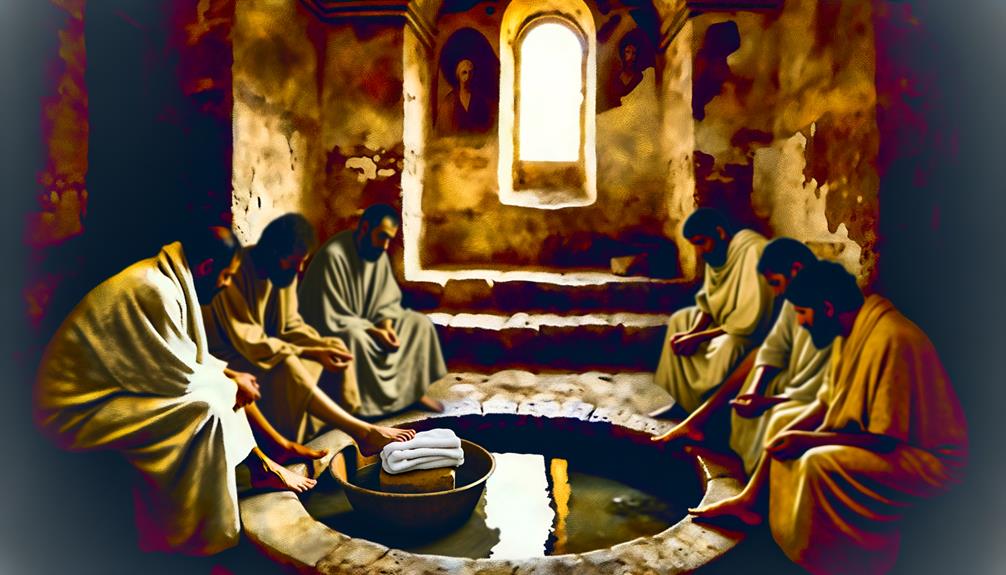Feet Washing In The Bible Meaning: Humility and Service
Feet washing in the Bible is a rich symbol of humility, servant leadership, and spiritual purification. Historically practiced in ancient Near Eastern cultures, it underscored hospitality and humility, often performed by individuals of lower status.
Biblically, it is most famously exemplified by Jesus in John 13:1-17, where He washes His disciples’ feet to model servant leadership and redefine societal norms. This act emphasized the theological principles of selfless service and communal equality.
Early church practices also incorporated feet washing to reinforce these virtues. Understanding its significance offers deeper insights into Christian servant leadership and communal values.

Feet Washing in the Bible: Symbolism of Humility, Service, and Cleansing
| Aspect | Description |
|---|---|
| Key Scripture | John 13:5–17 – Jesus washes His disciples’ feet |
| Cultural Context | Common ancient practice for hospitality and cleanliness |
| Spiritual Symbolism | Represents humility, service to others, and spiritual cleansing |
| Jesus’ Message | A call to serve one another with love and humility |
| Faith Application | Encourages believers to lead by example and serve selflessly |
| Theological Insight | Demonstrates the nature of Christ’s leadership and sanctification |
Historical Context

In the historical context of the Bible, feet washing was a customary practice that held significant social and religious implications.
In ancient Near Eastern cultures, the dusty, arid environment necessitated the frequent cleaning of feet, especially after travel. This act was typically performed by servants or individuals of lower social status, symbolizing humility and hospitality.
Within the Jewish tradition, feet washing also had ritualistic connotations, as cleanliness was integral to religious observances. Additionally, this practice underscored the values of service and humility, which were highly esteemed in biblical societies.
Understanding feet washing in its historical milieu enriches the comprehension of its symbolic depth and the socio-religious dynamics it encapsulated during biblical times.
Biblical References
The act of feet washing in the Bible is notably highlighted in the New Covenant, particularly through Jesus’ demonstration of humility and service when He washes His disciples’ feet in John 13:1-17.
This practice also finds roots in Old Covenant rituals, where it was often associated with hospitality and purity. These scriptural references collectively underscore feet washing as both a symbol of servitude and a ritualistic act of cleansing within the biblical tradition.
Jesus Washes Disciples’ Feet
Emphasizing humility and servitude, the account of Jesus washing His disciples’ feet is particularly chronicled in the Gospel of John, chapter 13.
In this passage, Jesus adopts the role of a servant, performing a task typically reserved for the lowest household slaves. By washing the disciples’ feet, Jesus subverts societal norms, offering a profound demonstration of love and humility.
This act serves as an essential teaching moment, instructing His followers to emulate His example of selfless service. The narrative encapsulates the theological essence of servant leadership, highlighting that true greatness in the Kingdom of God is measured by one’s willingness to serve others.
The episode also prefigures Jesus’ ultimate act of servitude and sacrifice on the cross.
Old Testament Rituals
Frequently overlooked in contemporary discussions, the Old Scriptures contain numerous rituals that incorporate acts of washing, each imbued with significant theological and cultural implications.
In the Old Covenant, washing was not merely a matter of physical cleanliness but held profound spiritual symbolism. For example, in Exodus 30:17-21, priests were commanded to wash their hands and feet before approaching the altar, symbolizing purification and readiness to serve God.
Similarly, Leviticus 16 outlines the Day of Atonement rituals, where washing is integral to the process of sanctification. These acts of washing served to delineate the sacred from the profane, emphasizing a covenantal relationship with God and the community’s collective purity.
Such rituals underscored the holiness required in worship and daily life.
Symbolism of Humility

The act of feet washing by Jesus, as recounted in John 13:1-17, epitomizes humility and challenges traditional notions of leadership.
By performing a task typically reserved for the lowest servants, Jesus not only exemplifies servant leadership but also redefines hierarchical structures within the cultural context of His time. This symbolic gesture underscores the intrinsic value of humility in spiritual and communal relationships.
Jesus’ Humble Act
In the New Covenant, the act of Jesus washing His disciples’ feet serves as a profound symbol of humility and servant leadership. This gesture, recorded in John 13:1-17, subverts traditional social hierarchies by positioning the master as the servant.
Jesus, fully aware of His divine authority, deliberately chose to perform a task typically reserved for the lowliest of servants. This act exemplifies the foundational Christian principle that true greatness is found in humbly serving others.
Servant Leadership Explained
Servant leadership, as exemplified by Jesus’ act of washing His disciples’ feet, encapsulates the essence of humility by inverting traditional power structures and emphasizing service over dominance.
This action underscores a profound theological and ethical paradigm, where the greatest leader is also the greatest servant.
By performing a task typically reserved for the lowest servants, Jesus demonstrated that true leadership is rooted in selflessness and the willingness to serve others.
This radical redefinition challenges conventional notions of authority and power, advocating for a leadership model that prioritizes the well-being and dignity of others.
Consequently, the symbolism inherent in this act serves as a timeless template for ethical leadership, urging leaders to practice humility and compassion in their roles.
Cultural Context Significance
Although often perceived through a theological lens, the cultural context of foot washing in biblical times reveals a deeply ingrained symbolic act of humility and hospitality.
In ancient Near Eastern societies, where sandals were common and roads dusty, washing feet was a necessary, albeit menial, task typically performed by servants or the lowliest household members. This act transcended mere cleanliness; it conveyed a profound message of servitude and respect.
Jesus’ washing of the disciples’ feet, thus, subverted social norms, illustrating that true leadership entails selfless service. By performing this humble act, Jesus underscored the importance of humility and a radical redefinition of authority, where greatness is measured by one’s willingness to serve others selflessly.
Act of Service

The practice of feet washing in the Bible is a profound illustration of humility and servitude, epitomized by Jesus Christ’s actions during the Last Supper.
This act functions as a tangible expression of selfless service, transcending cultural norms of the time. In a context where washing feet was typically a servant’s duty, Jesus’ deliberate choice to perform this task underscores the principle of servant leadership.
It serves as a didactic model, inviting adherents to embrace humility and prioritize the well-being of others. Consequently, feet washing not only symbolizes physical cleansing but also metaphorically represents the spiritual purification and community-building that arise from acts of genuine service.
This ritual highlights the foundational Christian ethic of love manifested through humble service.
Jesus’ Example

Jesus Christ’s act of washing his disciples’ feet during the Last Supper serves as a profound exemplar of humility and servant leadership in Christian doctrine.
This event, detailed in John 13:1-17, underscores Jesus’ role as a servant-leader, challenging societal norms of hierarchy and status. By performing this lowly task, traditionally reserved for servants, Jesus conveyed that true leadership entails service and sacrifice.
The symbolism of cleansing also highlights the spiritual purification of believers, reinforcing themes of redemption and sanctification.
This act is not merely a historical event but a theological cornerstone, illustrating the inversion of worldly values and calling followers to emulate Christ’s humility and love in their own lives.
Cultural Impact

Foot washing, as enacted by Christ, has significantly influenced various Christian traditions and practices, becoming a potent symbol of humility, purification, and communal service within diverse cultural contexts.
Historically, the act transcended its immediate ritualistic origins, permeating societal norms and religious ceremonies. In medieval Europe, monarchs and clergy would perform foot washing on Maundy Thursday, reflecting the hierarchical yet unifying nature of the practice.
In contemporary times, denominations such as the Mennonites and Seventh-day Adventists integrate foot washing into their liturgy, emphasizing equality and servitude.
The cultural resonance of this act underscores its enduring significance, fostering a collective identity rooted in the emulation of Christ’s humility and service, thereby bridging theological and sociocultural dimensions.
Early Church Practices

Building upon its cultural impact, the practice of foot washing also held significant liturgical and communal importance in the early Christian church.
Early Christian texts, such as the writings of the Apostolic Fathers, indicate that foot washing was not merely an act of humility but also a ritual symbolizing purification and fellowship. This practice was often incorporated into the early church’s gatherings, serving as a prelude to communal meals and Eucharistic celebrations.
Scholarly analysis suggests that foot washing reinforced the ethos of servitude and communal equality, aligning with Christ’s teachings in John 13:1-17.
Furthermore, its inclusion in early liturgical practices underscores its role in fostering a sense of unity and mutual care within the burgeoning Christian community.
Theological Interpretations
The practice of feet washing in the biblical context can be interpreted theologically as a profound demonstration of humility and servanthood, exemplified by Jesus in the Gospel of John.
This act also carries significant symbolic weight, representing spiritual cleansing and the purification necessary for discipleship. These themes underscore the transformative power of selfless service and inner sanctification within Christian doctrine.
Humility and Servanthood
In biblical theology, the practice of feet washing serves as a profound symbol of humility and servanthood, encapsulating the essence of Christ’s teachings on leadership and selfless service.
This ritual underscores several key theological principles:
- Imitation of Christ: Jesus demonstrated humility by washing His disciples’ feet, setting an example for His followers to emulate.
- Reversal of Social Norms: Feet washing, typically a servant’s task, challenges established hierarchies and promotes equality.
- Sacrificial Love: The act signifies a willingness to serve others at personal expense.
- Mutual Service: Encourages a community where members serve one another, fostering unity.
This practice remains a poignant reminder of the core Christian values of humility and service.
Spiritual Cleansing Symbolism
Among the various theological interpretations, feet washing is often viewed as a symbolic act of spiritual cleansing, representing the purification of one’s inner being and the removal of sin.
This interpretation finds its roots in John 13:10, where Jesus articulates that those who have bathed need only to wash their feet to be entirely clean. The act transcends mere physical cleanliness, suggesting a deeper, spiritual renewal.
Theologically, it signifies repentance and the continuous need for divine forgiveness. Early Christian communities may have practiced feet washing as a ritualistic reminder of baptism and the ongoing pursuit of sanctity.
Consequently, feet washing serves as a poignant symbol of the transformative power of grace, reinforcing the necessity of spiritual vigilance and purity.
Modern-Day Relevance

How does the ancient practice of feet washing translate to meaningful actions in contemporary religious communities? Feet washing, rooted in biblical tradition, retains potent symbolic value today. It serves as an emblem of humility, service, and spiritual cleansing, transcending its original cultural context to inspire modern believers.
Modern applications include:
- Ritual Humility: Emphasizing leaders’ duty to serve their followers.
- Community Building: Encouraging mutual respect and unity within congregations.
- Spiritual Renewal: Acting as a physical manifestation of inner purification.
- Compassionate Service: Inspiring acts of kindness and charity within and beyond religious settings.
Thus, feet washing continues to be a relevant practice, embodying timeless spiritual principles in today’s religious communities.
Personal Reflection

Engaging in the practice of feet washing invites individuals to contemplate their personal spiritual growth and the depth of their commitment to humility and service.
This ritual, rooted in biblical tradition, serves as a profound reminder of the virtues espoused by Jesus Christ. Reflecting on one’s willingness to perform such a humble act can reveal insights into personal faith and the embodiment of Christian values.
| Aspect | Reflection Questions | Personal Insights |
|---|---|---|
| Humility | How do I demonstrate humility daily? | Instances of pride and humility |
| Service | In what ways do I serve others? | Acts of kindness and service |
| Spiritual Growth | How is my faith evolving? | Milestones in spiritual journey |
| Community Impact | How do my actions affect my community? | Contributions to communal well-being |
| Biblical Adherence | How closely do I follow biblical teachings? | Alignment with scriptural principles |
This introspective exercise fosters a deeper understanding of one’s spiritual journey.
Conclusion
The act of feet washing in the Bible holds profound historical and symbolic significance, encapsulating themes of humility, service, and discipleship. Jesus’ example set a foundational precedent for the early Church, embodying theological principles that resonate through centuries.
How does this ancient practice inform contemporary understandings of servitude and community within modern religious contexts?
By examining its historical roots and symbolic meanings, one gains deeper insights into the perennial relevance of this humble act.






